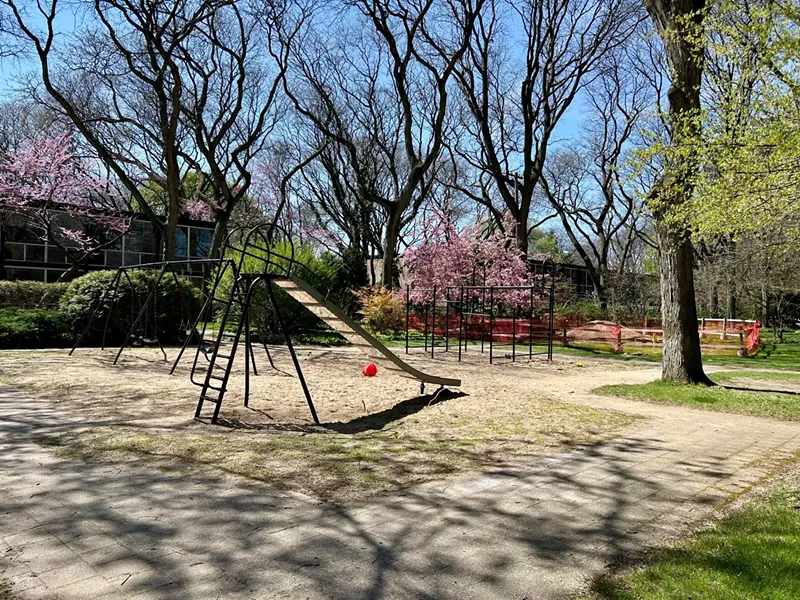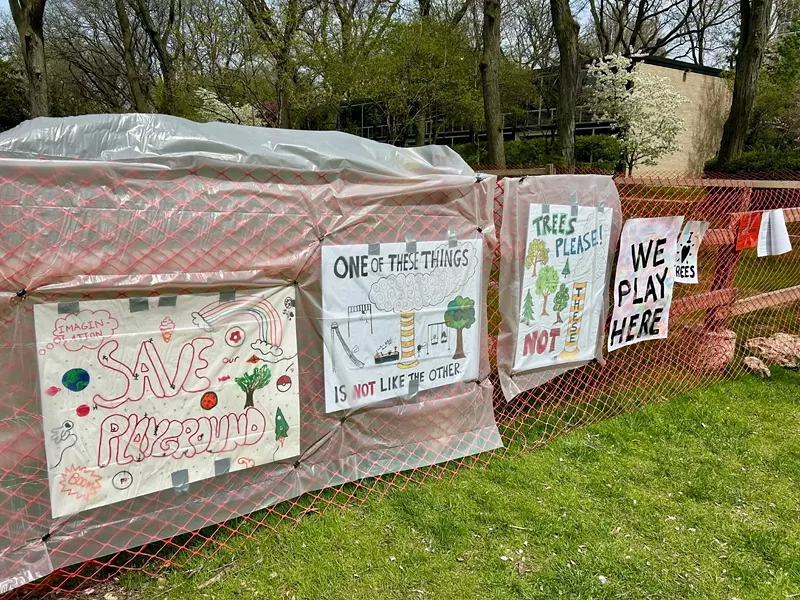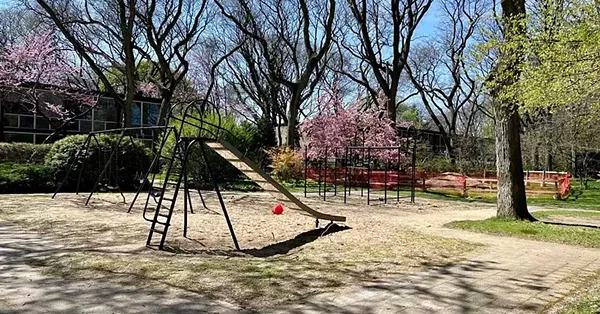A controversial steam project in Detroit’s Lafayette Park Historic District is drawing new scrutiny after documents show a high-ranking city official helped reverse a recommendation opposing the work and privately contacted commissioners ahead of a key vote.
Detroit’s Planning Director Alexa Bush coauthored a recent staff report that supported Detroit Thermal’s excavation plans, despite an earlier report from May 14, which was written by staff, that warned the project would “fail” to meet preservation standards and cause irreversible damage to the historic landscape. Bush’s involvement was revealed in internal city emails obtained through a Freedom of Information Act request and has raised concerns among residents that the independent Historic District Commission (HDC) is being inappropriately influenced by city hall.
One of Bush’s emails, written to herself in advance of the HDC’s May 14 meeting, included a note to “call and see what votes we have — calling commission members.” Bush’s later decision to coauthor the July 2 report has led residents to accuse the city of orchestrating a predetermined outcome in favor of Detroit Thermal, a private utility owned by a foreign investment firm.
“This is so very disappointing,” said Angela Fortino, board member of the LaSalle Townhouse Cooperative. “Since this process started, there have been red flags that the City was working behind the scenes to push this project through. We’ve been concerned that this was motivating Detroit Thermal’s lack of engagement with us. But we gave the City the benefit of the doubt and have been working in good faith to follow the legal process. To see now that a senior City official in charge was working all along to rig the system towards a predetermined outcome is extremely discouraging. We now see that we never had a chance for a fair hearing.”
But in a statement to Metro Times, Bush said the allegation is based on a “fundamental misunderstanding.” She said the July 2 staff report was not a reversal of the previous recommendation, but a separate review based on a newly submitted application that significantly differed from the original.
“Our first report and recommendation was based on Detroit Thermal’s first application,” Bush wrote. “Our second report and recommendation was based solely on the 2nd application, which had significant changes from the first application, which was withdrawn by Detroit Thermal.”
Bush also defended her role in contacting commissioners and coauthoring the report.
“It is the role of the Planning Director to have opinions and make recommendations regarding projects like this,” she said. “I would have been negligent in my duties if I did not.”
Citing city code, Bush noted that the planning director has the right to fully participate in HDC meetings, aside from voting. As for the internal email about calling commissioners, Bush said it was one of many notes she jotted down and should not be taken out of context.
The dispute centers on Detroit Thermal’s proposal to use underground steam lines to provide heat to the 1300 Lafayette East Cooperative, a high-rise tower whose boilers failed in 2022. The pipeline would cross through Lafayette Park’s legally protected National Historic Landmark landscape, which includes rare, mature vegetation and was designed in the 1950s by legendary modernist architect Ludwig Mies van der Rohe and landscape architect Alfred Caldwell.

Steve Neavling
One of Detroit Thermal’s excavation sites is next to a playground, which residents say is the “heart” of the area.
In May, the city’s preservation staff warned the excavation would damage or destroy decades-old trees and plantings that cannot be replaced “in kind,” concluding that the proposal failed multiple historic preservation standards. The updated July 2 report reversed that conclusion, stating that impacts could be mitigated through restoration and tree protection measures.
The new report omits earlier staff language that emphasized the landscape’s irreplaceability and shifts the focus to broader “rehabilitation” standards. Ventilation stacks initially included in the proposal were removed, and the report highlights Detroit Thermal’s use of smaller equipment and an arborist-managed aftercare plan as signs of improvement.
But residents say those changes came with no public engagement and were submitted directly to the HDC without community input, despite promises from the city that Detroit Thermal would first meet with the neighborhood to discuss the revised plan.
“They said they would meet with us only to string us along while signing their contract,” Susannah Goodman, vice president of the Nicolet Townhouse Cooperative, said. “They canceled the meetings the day before they were to start. They’ve done the same thing again. After the May 14th HDC hearing, they promised to meet with us once they had updated plans to get our feedback. We waited patiently and operated in good faith. Suddenly, we learned that they submitted their plans directly for approval without ever meeting with us. Why would we believe anything they say?”
Goodman and other residents also objected to the framing of the project as a dispute between neighbors. They say the narrative, promoted by Detroit Thermal’s PR firm and echoed in Bush’s internal notes, downplays the broader concern that a private utility is being allowed to damage a nationally significant cultural site.

Steve Neavling
Children drew colorful signs in protest of the steam project near their playground.
“This is not a dispute between two neighbors, as repeatedly mischaracterized by Detroit Thermal,” Angelyn Frankenberg, a board member of the Nicolette Townhouse Cooperative, said. “This situation is the result of Detroit Thermal, a private, foreign-owned company, inserting itself into a Detroit neighborhood and working behind closed doors for months developing plans without talking to the property owners or engaging the residents.”
The National Park Service, which designated Lafayette Park a National Historic Landmark in 2015, also expressed concern in a letter to the city, urging that “alternative options” be considered and evaluated. Residents said no such alternatives have been shared with them.
An earlier city staff report warned that even limited excavation in the area would disrupt the carefully designed spatial relationship between the townhomes and the naturalistic landscape, which features 60-year-old honey locusts, clipped hawthorn hedges, and a layered design that creates “outdoor rooms” throughout the development.
While the revised report acknowledges the landscape’s importance, it focuses on broader character areas rather than individual plants, and contends that the landscape’s integrity could be preserved if damage is minimized and restoration is handled properly. Critics say that approach downplays the risk.
The May staff report cited a 1960 Architectural Forum article that described the complex as having an air of “comfortable repose,” adding, “Reconstruction of a historic mature landscape, even stipulating that such a step was possible, is unlikely.”
The revised proposal is scheduled to be reviewed by the HDC during a special meeting on Wednesday. Residents have called on the city to delay the hearing, citing its timing during the Fourth of July holiday week.
Despite residents’ concerns, Detroit Thermal says the project is essential to provide safe, reliable heat to the residents of 1300 Lafayette East and insists it has listened to community feedback.
The company praised Bush’s report.
“We are grateful for the Historic Detroit Commission’s staff report, which recommends approval of Detroit Thermal’s application to reconnect the 1300 Lafayette East Cooperative to our heating system,” Detroit Thermal spokesman Harvey Hollins III said. “We look forward to presenting the updated application next week to the commission itself and to the Lafayette Park community, including the 600-plus residents at 1300 East Lafayette who urgently requested our heating solution.”
Hollins says he believes the report addresses residents’ concerns.
“The thorough HDC staff report concludes that the Detroit Thermal project ‘minimizes impacts on the historic landscape’ of Lafayette Park and ‘could present an opportunity’ to ensure the ongoing integrity and health of this important landscape,” he says. “We believe this addresses the concerns raised by some of our Lafayette Park neighbors.”
He adds, “Our hope is the HDC approves our application so we can complete the paused project in time for winter.”
But residents of the surrounding townhouses say the city has abandoned the transparency and accountability the Historic District Commission is supposed to uphold.
“We oppose the project because it would irrevocably damage our historic landscape,” says James Fidler, a board member of the Nicolet Townhouse Cooperative. “It took 60 years of time, investment, and stewardship to become what it is today. Our 60-year-old landscape cannot be simply restored after excavation.”
The assertion is supported by certified arborist Kay Sicheneder, who reviewed Detroit Thermal’s plans.
(Except for the headline, this story has not been edited by PostX News and is published from a syndicated feed.)

